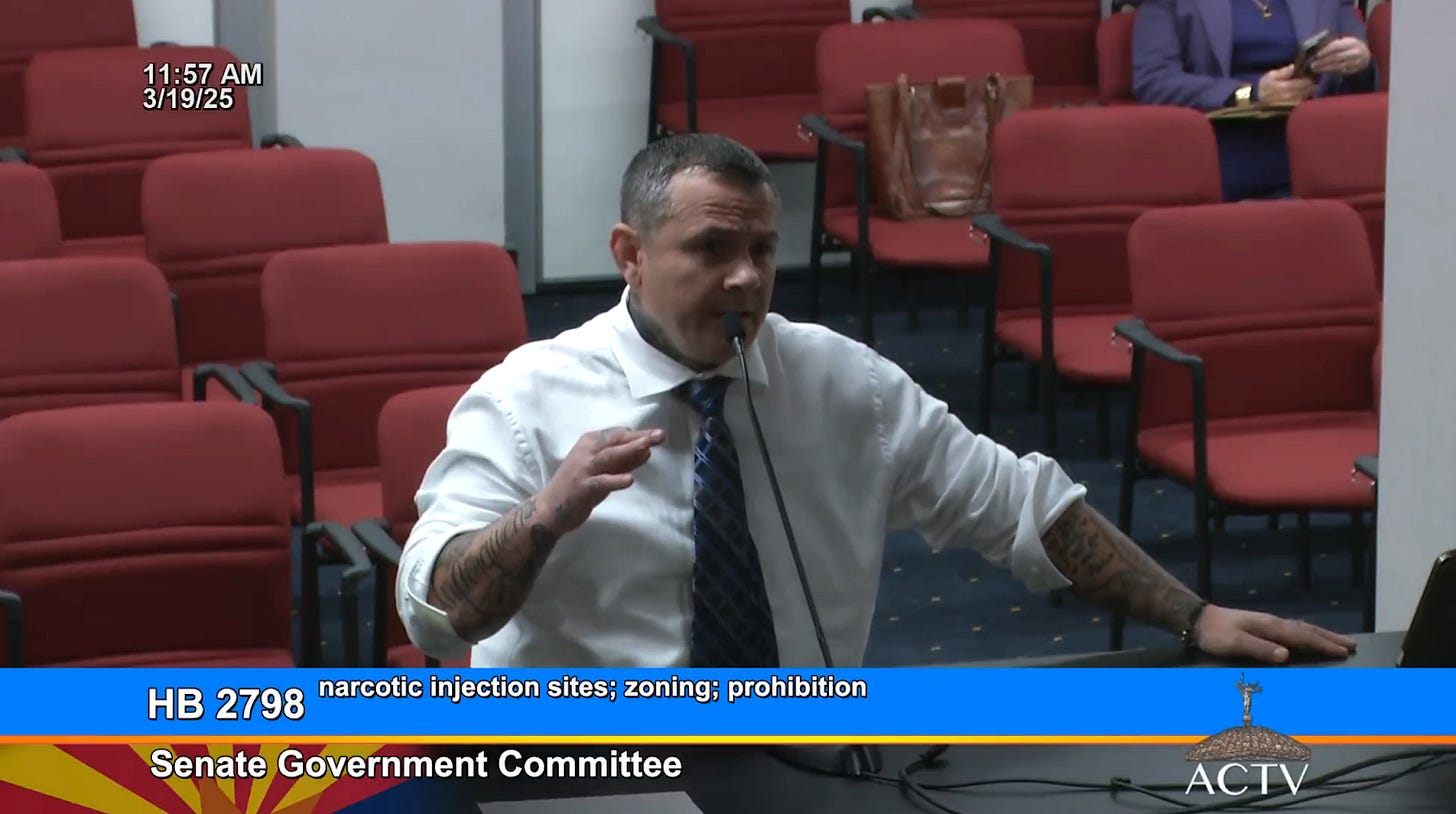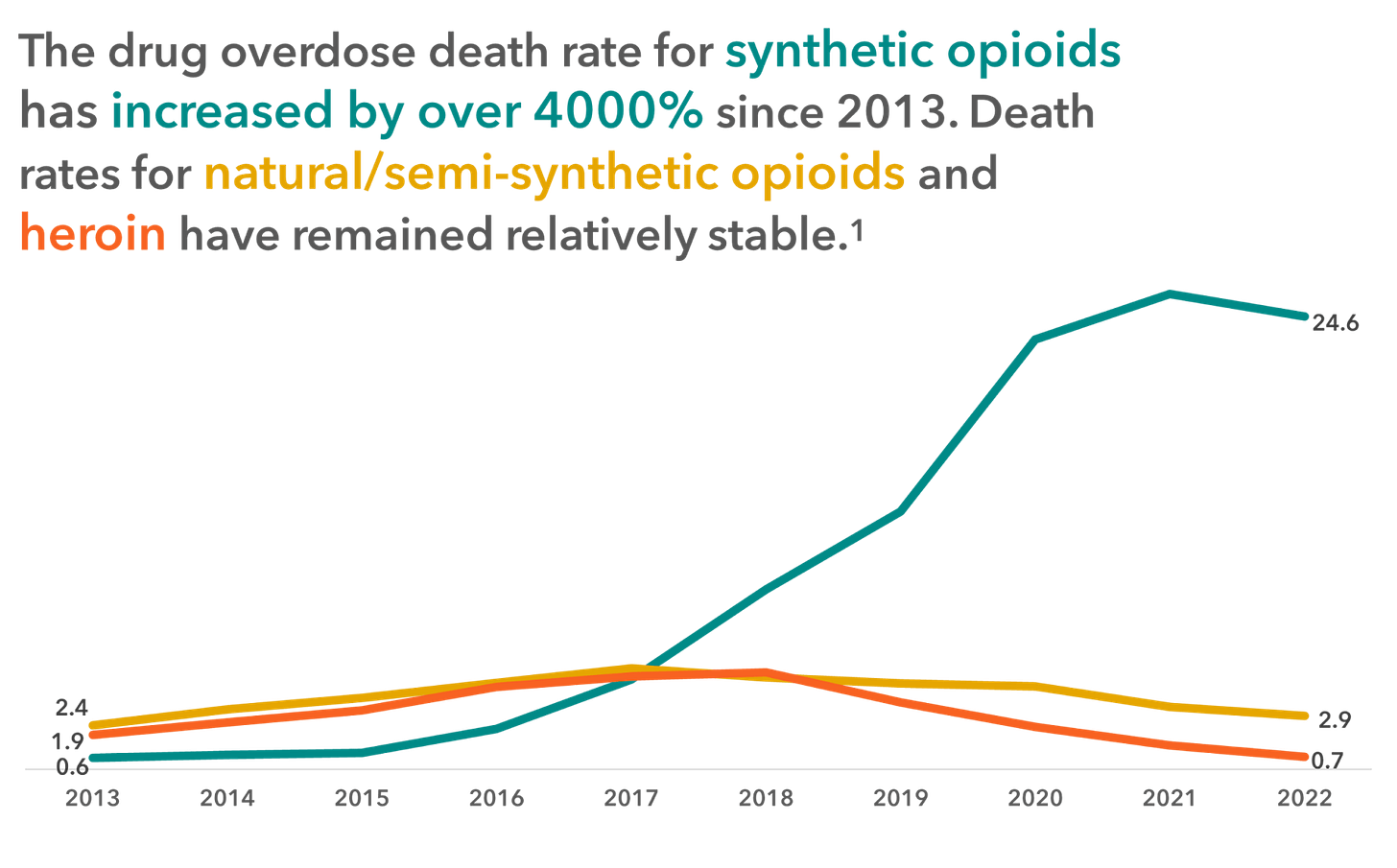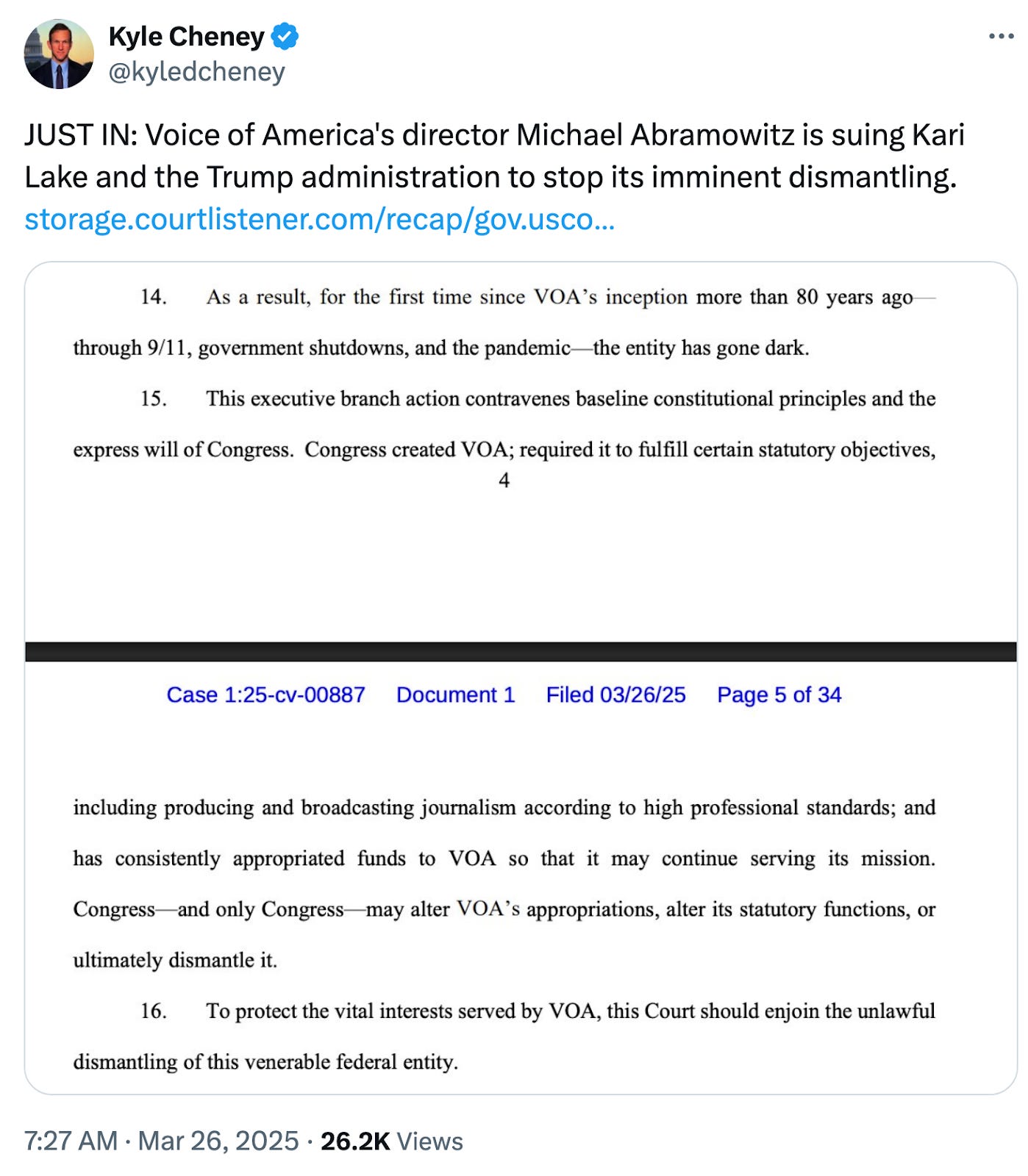
First, do less harm
Banning a solution before it exists … Fontes got the attention he sought … And comrade Elmo.
Jaime Rose doesn’t have a conventional job.
One of his many duties is finding people who use drugs in Douglas, Arizona, and giving them new needles. He is intimately familiar with the value of a clean syringe.
Rose joined the Army at 18 and later the Army Reserves. He was discharged after a car accident that caused a severe back injury, and a doctor prescribed him Oxycodone for the pain.
The pain medicine devolved into a debilitating addiction for Rose, as is the case for millions of Americans. His back injury treatment eventually turned into a heroin dependency.
Rose got in trouble with the law when trying to fund his addiction and ended up in prison, where he said he used heroin the entire time. He shared a makeshift needle while incarcerated that gave him Hepatitis C.
Rose is now six years sober. He works with Sonoran Prevention Works, a group that helps people who use drugs avoid the deadly consequences of opioid dependency by providing syringe exchanges, fentanyl test strips and overdose-reversal drugs.
He knows opioids can be life-ruining.
“I went from actually doing good in life to this drug taking everything I had. Now I see others going through the same — it's like watching a rerun of a movie. So I'm out there trying to stop others and help them,” Rose said.
This year, he’s traveled to Arizona’s state Capitol twice to tell lawmakers his story and try to convince them to reject Republican Rep. Matt Gress’ HB2798, which would prevent the state from ever legalizing overdose prevention centers.

The centers are places where people can go to safely use drugs outside of the public eye, and the mere idea has caused a lot of Republican pearl-clutching this year.
The facilities are staffed with healthcare professionals who let people bring in drugs they obtain on the streets and test the drugs for lethal fentanyl while providing sterile needles. They monitor users for adverse reactions.
It’s a means to combat the thousands of overdoses occurring from untested drugs and bloodborne diseases like Hepatitis and HIV spreading from sharing needles.
But Arizona doesn’t have any overdose prevention centers, or as Gress’ bill puts it, “narcotic injection sites.”
And Gress wants to make sure opioid prevention centers never exist in Arizona.
“It is not okay to have medical professionals spending their time supervising people shooting up illegal drugs,” he told a House committee. “This bill is going to send a clear message that that's not the policy direction the Grand Canyon State will be headed in.”
But in that committee, Gress also did a pretty good job of explaining why the centers exist.
“The idea behind these supervised injection sites is to give vulnerable people a safe place to do what they would be doing anyway, but in a safe environment,” he said.
Several grassroots groups like Sonoran Prevention Works already provide harm reduction measures to stop people from overdosing or spreading disease.
In 2021, then-Gov. Doug Ducey signed laws that legalized clean needle exchange sites and fentanyl testing products. Gress is almost certainly aware of those changes to reduce overdose deaths — he used to work as Ducey’s budget director.
Ducey declared a state of emergency for Arizona’s opioid epidemic in 2017, when opioid overdose deaths increased 74% within five years. Last year, 1,592 people died from opioid overdoses in Arizona, and 90 more have been confirmed so far this year, per the state health department.
Providing medical oversight in a clinical environment isn’t that big of a step from the harm reduction measures that already exist in Arizona. But for Gress, medical supervision is a step too far.
Rose, informed by his lived experience and years of working directly with people who use drugs, told lawmakers the state “can't arrest their way out of this problem.”
“I understand there's fear because the narcotic part and all that … but if we don't open our minds and start doing something different, nothing's going to change,” he told the House committee.
Through his work at Sonoran Prevention Works, Rose knows dirty needles litter the ground because after people use them, they don’t want to be caught with paraphernalia. He knows that opioid addiction is debilitating, and people without homes will resort to using drugs in public bathrooms and parks. And he knows people die from overdoses all the time. His best friend died from an overdose a few weeks ago.
Dedicating a center to safe drug use would not only save lives, he said, but mitigate the public blight that comes with drug use.
“This is not saying we're going to build it tomorrow. But why would we block an idea out that's already working in other places?” he said.
Jeffrey Singer also urged lawmakers to reject the legislation expressly outlawing prevention centers. Unlike the seven members of the Senate’s Government Committee, he’s an expert on the topic.
Singer is a practicing surgeon in Phoenix and a senior fellow at the Cato Institute who studied and published a paper on overdose prevention sites in 2023.
He found strong evidence that the sites decrease disease transmission, overdose deaths and public drug use, and increase the number of people who seek addiction treatment.
“A lot of these clients, after a while, they start to open up to the staff where they hadn't been willing to. They'd been afraid. And they say things like, ‘I need help. Could you get me help?’ And they get them help,” Singer said.
The centers have been around since the 1980s, and 148 of them existed across 16 countries at the time Singer published his research.
New York City has two overdose prevention centers run by a nonprofit called OnPoint NYC that says it has reversed 1,700 overdoses since 2021. Rhode Island opened its first center in December, while Vermont lawmakers recently overturned the governor’s veto on a bill to bring an overdose prevention center to Burlington.
Singer’s research has also given him an in-depth understanding of the resistance to treatment centers: They’re perceived as a way to enable people to use drugs.
Across two committee hearings and a House floor vote, every Republican who has voted on Gress’ bill to preemptively outlaw the treatment centers has supported it.
“If you want to help a drug addict, you need to help free them from the addiction and not let them continue in the addiction. And that's just heartbreaking for me,” Republican Rep. Rachel Keshel said.
But Singer said doctors practice harm reduction every day. When someone has complications from obesity, doctors prescribe blood pressure and cholesterol-lowering drugs. When a patient has COPD from smoking, doctors prescribe medications and oxygen tanks — even if the patient won’t quit smoking, he said.
“As a doctor, my mission is to reduce pain and suffering and to fight death. So I'm doing what I can to make your lifestyle choices less dangerous,” Singer said. “I tell all my patients not to smoke, but if they get into trouble from it, I'll help them.”
And the centers actually save the government money, Singer found. Calls for 911 and EMS services decreased in places using overdose prevention centers, and while the centers need government permission to operate, they’re usually run by nonprofits and groups that rely entirely on donations and grants.
Meanwhile, the state’s Medicaid system paid more than $20,000 for Rose’s Hepatitis C treatment.
Singer realizes Arizona’s conservative Legislature isn’t likely to legalize the treatment centers any time soon.
But he thinks lawmakers shouldn’t preemptively ban the centers as people continue to die of overdoses and preventable diseases on the streets.
“I think it's a bad idea on a lot of levels — closing the door on Arizona, local communities … to try innovations when we have an average of five Arizonans a day dying in this state from overdoses,” he said. “More and more states are starting to realize that this is not a panacea, but it's a tool in a tool chest.”
Rest in Peace: After former U.S. Rep. Raúl Grijalva was laid to rest yesterday, Secretary of State Adrian Fontes laid his nascent campaign to rest, saying he wouldn’t run to replace the congressman. That leaves former Democratic state Rep. Daniel Hernandez as the only official serious Democratic candidate, though politicos are expecting word soon from Pima County Supervisor Adelita Grijalva, who said she would make an announcement after her father’s funeral. Among the many dignitaries at the funeral mass yesterday was U.S. Rep. Alexandria Ocasio-Cortez.
New class dropping?: Maricopa County Supervisors appointed Kiana Sears to the state Senate yesterday to replace Eva Burch who resigned this month citing the low legislative pay. Sears is a longtime Mesa Public Schools board member, former Corporation Commission candidate and a current non-teaching employee at ASU — which could be a hiccup since the state Constitution prohibits lawmakers from working other government jobs except for “employment as a teacher or instructor in the public school system.” She's working out logistics ahead of her swearing in Monday, per a Senate Democratic spokesperson.
Disciplined or day off?: Three Phoenix police officers involved in the unprovoked beating and tasing of an innocent, deaf Black man with cerebral palsy were “rewarded” with a 24-hour unpaid suspension, the Phoenix New Times’ Stephen Lemons writes. The incident went down after Circle K employees called the police on a white man. Police rolled up and abruptly jumped Tyron McAlpin, tasing him four times and punching him at least 10 times without asking any questions. McAlpin spent 24 days in jail before ABC’s Dave Biscobing got the video of the brutal arrest last year and blew up the story, forcing prosecutors to drop all charges.
A rabbi and a minister get locked in a cell…: Four protesters who face misdemeanor trespassing charges after joining a 2023 protest at the UofA against selling missiles to Israel are claiming the Religious Freedom Restoration Act protects them from prosecution, the Tucson Sentinel’s Paul Ingram reports. One is studying to become a rabbi, another is an ordained Protestant minister and all four of them “share a protected religious belief in the sanctity of human life and in the necessity of conscientious action to prevent genocidal acts from being carried out with the support of their government," their lawyer argues. They were among 25 people arrested at the event, including KJZZ reporter Alisa Reznick, though prosecutors dismissed charges against her.
Maybe next year: Despite several recent high-profile incidents of legislative lead-footing, voters won’t get to decide whether lawmakers should keep their get-out-of-jail-free card for traffic tickets, Capitol Media Services’ Howard Fischer reports. GOP Rep. Quang Nguyen tried to get the measure on the ballot for voters to decide, and his bill got pretty far. But fellow Republican Sen. Kevin Payne wouldn’t give the bill a hearing in the Public Safety Committee he chairs.
We would like to drag race with lawmakers, but burning that much gas is expensive. Help us fill our tanks with a paid subscription.
Not looking good: Buckeye City Manager Dan Cotterman stepped down this week because of an investigation, but officials won’t say what the investigation is about, KTAR’s Lance Hartzler reports. The Arizona Department of Child Safety contacted Buckeye police last week, but Cotterman hasn’t been charged with anything yet.
Yesterday’s congressional subcommittee hearing titled "Anti-American Airwaves: Holding the Heads of NPR and PBS Accountable" was — as you might expect — pretty freaking wild.
There were a few fun points, like when Democrats started grilling the PBS head about whether red puppet Elmo “is now or ever has been a member of the Communist Party” and implied Republicans want to defund public media because Bert and Ernie are “part of an extreme homosexual agenda.”
But people, this shit is not funny.
Our government is trying to tear down journalistic institutions like PBS and NPR.
And that’s just the start.
Please donate to your local NPR and PBS stations today.
And support independent local news. We need you now more than ever.













